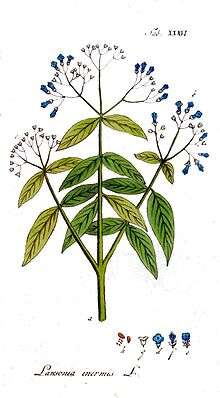
Henna (song)
"Henna" is a song by Swedish pop artist of Iranian origin Cameron Cartio featuring the raï Algerian singer Khaled (musician). Music was composed by Alex Papaconstantinou to lyrics by Khaled (Arabic) and Cameron Cartio in a conlang of his own and by Marcus Englöf. The song was produced by Alex Papaconstantinou and mastered at Cutting Room in Stockholm.
The song was from the debut album of Cameron Cartio entitled Borderless. The Khaled involvement came after Cameron had broken up with his girlfriend who was a huge Khaled fan. So Cartio, then an aspiring and relatively unknown artist wrote the lyrics in his own conlang and sent them to Khaled, who agreed to add his own part as a tribute to Cartio's ex-girlfriend.
The song was released on Sony/BMG and Universal and for the Arab World on EMI Arabia. In addition to popularity in Sweden and throughout the Iranian diaspora, the song became hugely popular in the Arab World basically because of the involvement of Khaled in the Arab diaspora.

Henna
Henna (Lawsonia inermis, also known as hina, the henna tree, the mignonette tree, and the Egyptian privet) is a flowering plant and the sole species of the Lawsonia genus. The English name "henna" comes from the Arabic حِنَّاء (ALA-LC: ḥinnāʾ; pronounced [ħɪnˈnæːʔ]) or, colloquially حنا, loosely pronounced as /ħinna/.
The name henna also refers to the dye prepared from the plant and the art of temporary body art (staining) based on those dyes (see also mehndi). Henna has been used since antiquity to dye skin, hair and fingernails, as well as fabrics including silk, wool and leather. The name is used in other skin and hair dyes, such as black henna and neutral henna, neither of which is derived from the henna plant.
Historically, henna was used for cosmetic purposes primarily in Ancient India. It was also found to be used in the Arabian Peninsula, South Asia, Carthage and other parts of North Africa, and the Horn of Africa. Bridal henna nights remain an important custom in many of these areas, particularly among traditional families.
Henna (film)
Heena is the name of a 1991 Bollywood film produced and directed by Randhir Kapoor and starring his brother Rishi Kapoor, Ashwini Bhave (both of India) and Zeba Bakhtiyar (of Pakistan) also renowned as Neha Seti. It was shot in Kashmir. This film's project was planned and started by legendary director Raj Kapoor but due to his demise during the filming stage, the remaining portions were directed by his son Randhir Kapoor. Hence, this film is considered as the last film of Raj Kapoor. The film was an Indo-Pak project, hence the dialogues of the film were written by the Pakistani legendary writer Haseena Moin on Raj Kapoor's personal request. The film was a critical and a commercial success and was also India's submission for the Academy Award for Best Foreign Language Film, but was not accepted as a nominee.
Plot
The story revolves around the mistaken straying (due to a car accident which also caused him to suffer amnesia) of Rishi Kapoor into the Pakistani side of Kashmir from his own home in Srinagar . A native girl called Henna (Zeba Bakhtiar), falls in love with him , amidst the controversial Indian-Pakistani tension on Kashmir which leads him to be suspected by the Pakistani police of being an Indian spy.
Henna (disambiguation)
Henna (or Hina) is a flowering plant, from which dyes are made that is utilized for body art. Henna may also refer to:
Places
People
Henna is an Arabic female given name which means "blessed". It is also a Finnish female given name.
Other

Song
A song is a single (and often standalone) work of music intended to be sung by the human voice with distinct and fixed pitches and patterns using sound and silence and a variety of forms that often include the repetition of sections. Written words created specifically for music or for which music is specifically created, are called lyrics. If a pre-existing poem is set to composed music in classical music it is an art song. Songs that are sung on repeated pitches without distinct contours and patterns that rise and fall are called chants. Songs in a simple style that are learned informally are often referred to as folk songs. Songs that are composed for professional singers are called popular songs. These songs, which have broad appeal, are often composed by professional songwriters, composers and lyricists. Art songs are composed by trained classical composers for concert performances. Songs are performed live and recorded. Songs may also appear in plays, musical theatre, stage shows of any form, and within operas.
& (disambiguation)
&, or ampersand, is a typographic symbol.
& may also refer to:
Song (disambiguation)
A song is a musical composition for voice or voices.
Song or songs or The Song may also refer to:
Music
Albums
Songs
Podcasts:

